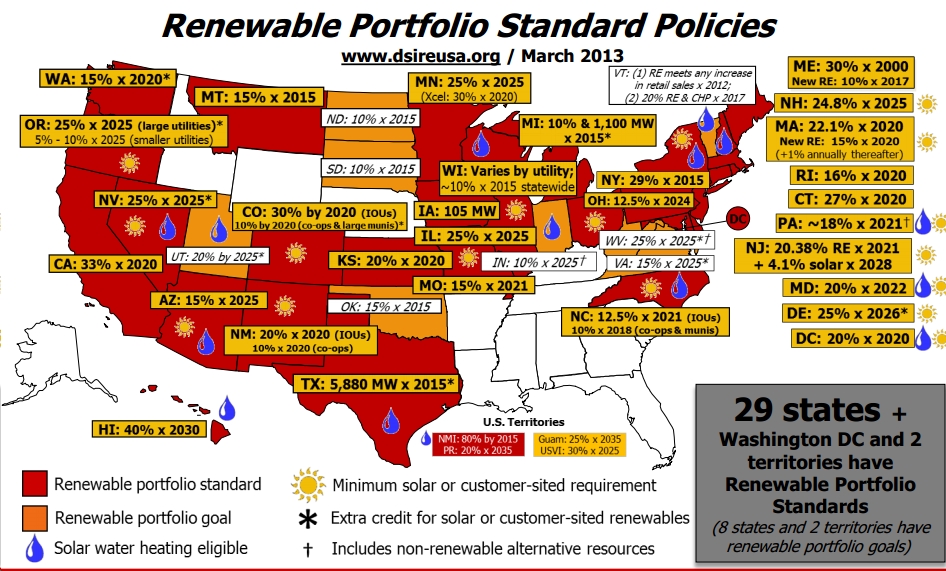About Bacon’s Rebellion
Bacon's Rebellion is Virginia's leading independent portal for news, opinions and analysis about state, regional and local public policy. Read more about us here.
Leading Virginia To A Clean Energy Future
The Case for A Mandatory Renewal Portfolio Standard (RPS)
by Lowell Feld and "Kindler," Blue Virginia
The U.S. government is at its most effective when it sets big, forward-looking goals for society – sending a man to the moon, overcoming the Great Depression, eliminating slavery, creating the national parks system. In each of these cases, we could have said: “no problem, the free market will take care of it!” But that wouldn’t have gotten the job done, and all of us would have been worse off as a result.
The ongoing battle against global climate change, caused largely by the use of fossil fuels, is a classic case of systemic "market failure" necessitating strong governmental action to correct it. In this case, most of the enormous environmental, health and social costs of fossil fuels are simply unaccounted for in their price. So fossil fuels are priced far lower than they would be if those costs were accounted for -- meaning that the oil, gas and coal industries get a free lunch, while we pay for all the damage they cause.
Renewable Portfolio Standards (RPSs) are a highly effective way to begin to level the playing field in ways that make it easier for renewable energy sources to compete. But since it requires the government to take a stand, we can already hear our conservative friends saying NO: government must not interfere with the "free market," government must not “pick winners and losers, government screws up everything it touches, we should let the market figure it all out. So let’s just be clear on a few key points:
1. There never has been a "free market" for energy in this country, and there certainly isn't one today. The truth is that the government for many years has subsidized fossil fuels on a massive scale. From 1950 through 2010, federal incentives to fossil fuels in the U.S. alone amounted to nearly $600 billion. In contrast, subsidies to non-hydro "renewables" (including ethanol and 2009 stimulus aid) only amounted to around $80 billion, a small fraction of fossil fuel subsidies. The bottom line is that the fossil fuel industries have been operating for many decades on a playing field that's heavily tilted by government policy in their direction. In addition to subsidization, government policies have allowed fossil fuel companies to blow up mountains, pollute the air and water, tear down forests, and harm people's health and wellbeing, with the costs borne by society while the companies reap the benefits. Another example of pro-fossil-fuel policies: The government has built an interstate highway system to encourage one mode of transportation and land use (e.g., oil-powered motor vehicles, sprawl development) over others (e.g., high-speed rail, high-density development patterns). These policies have had enormous implications for U.S. energy usage patterns, and must be considered in any analysis of U.S. or state energy policy options.
2. Government is always, inevitably, "picking winners and losers," whether intentionally or unintentionally. Every action government takes -- or doesn't take -- benefits some interests and hurts others. Leaving the energy market as it is obviously helps the oil, gas and coal industries, which have effectively "captured" the government, using their access to taxpayer-funded corporate welfare and benefits for over a century to rake in enormous profits and to block non-fossil-fuel competitors from seriously impinging upon their market share. Allowing that situation to continue simply means picking these industries to continue to be the winners.
3. Leaving the field to the fossil fuel industries simply to "save jobs" would be the equivalent of stopping Henry Ford from developing the auto industry in order to save horse and buggy-related jobs. We need to make smart investments for the future, not cling to the dinosaurs of the past while they slowly head toward extinction.

Despite the huge historic advantages of the fossil fuel industries, we currently have a golden opportunity to change this dynamic and allow less destructive sources of energy a chance to succeed. The time is right for a variety of reasons - the massive drop in the cost of solar power (from 77 DOLLARS per watt in 1977 to just 64 CENTS per watt in 2013); a continued decline in wind power costs (including this exciting development); and of course the urgency of slowing anthropogenic climate change. What's needed, clearly, is for government to level the playing field, correcting for "market failure" so that every energy source is priced at its true, fully-internalized cost. In the case of climate change, one obvious solution would be to impose a significant carbon tax (which could be made revenue neutral, for instance by cutting income taxes equivalently). Unfortunately, due to right-wing opposition to any taxes, no matter how much sense they make from a public policy perspective, that doesn't seem to be an option in Virginia or the U.S. at the moment. This leaves us with a number of policy options -- of which renewable portfolio standards (RPSs) are one of the most effective.
RPSs are an example of government playing its most appropriate role -- setting societal goals while leaving it to the marketplace to figure out the best way to achieve those goals. This type of performance-based regulation allows industry to do what it does best -- innovating to reach its targets in the most effective, efficient and cost-effective ways possible -- and thus represents the best way to get the public and private sectors working together. Needless to say, for these goals to be taken in the least bit seriously, they need to be mandatory. Sadly, Virginia's voluntary RPS "standards" have been completely ineffective.
We've heard conservatives, like Ken Cuccinelli, argue that RPSs have raised energy prices, led to job losses, and other supposed horrors. These claims are flatly, even outrageously, false (see here for more on that subject). In fact, RPSs are in place and operating successfully across the country, including in numerous Republican-dominated states - Texas, Kansas, Montana, Arizona and Ohio, just to name a few. The lack of a mandatory RPS doesn’t make Virginia any more “conservative," just more backwards (and also losing the race for clean energy jobs), than the majority of U.S. states -- and a bunch of other countries.

The evidence that RPSs are working well (e.g., they are spurring clean energy development without raising costs or costing jobs) is extensive. For instance, a study earlier this year by the Union of Concerned Scientists found that meeting RPS requirements has been "an affordable way for utilities to add power-generating capacity while reducing dependence on fossil fuels." A few examples illustrate this point:
- In Michigan, a "2013 Public Service Commission (PSC) report found that: the state’s utilities are on track to meet the 10 percent standard at lower costs than anticipated... and renewable energy contracts continue to show a downward pricing trend."
- In Kansas, "RES-driven development by the state’s two largest utilities in 2012 and 2013, which will put them more than halfway toward meeting their 20 percent by 2020 target, is resulting in a modest 1.7 percent rate increase for energy consumers."
Regarding jobs, there are many RPS success stories. For instance:
- Kansas: "12,300 jobs have been created by Kansas's 19 wind farms, including more than 3,700 jobs directly related to the construction and operation of the projects."
- Ohio: "Ohio is home to a leading U.S. component supplier for wind turbine equipment manufacturers and a top producer of solar materials across the supply chain, and more than 160 companies are providing jobs in the solar industry."
- North Carolina: "The North Carolina RPS contributed $1.4 billion in investment in clean energy projects between 2007 and 2012 (a 13-fold increase) while creating or saving more than 20,000 jobs and holding electricity rates steady."
Finally, it's worth noting that the politics of this issue are shifting, with an increasing number of conservatives actually defending RPSs. That's a big part of the reason why ALEC's assault on RPSs in 2013 was a huge flop. Heck, even Barry Goldwater, Jr., is busy fighting for solar power these days, based on his "conservative, free-market principles rooted in 'creating choices for the American consumer.'" And, believe it or not, in Georgia, there's even a Green Tea Party movement by conservatives who believe that a) " Big Energy — especially utility monopolies like Georgia Power — have too much centralized power"; b) "Big Energy and its government cronies...conspire to strangle competition, distort the market, and hold consumers hostage;" c) decentralized renewable energy options like rooftop solar " puts more power in the hands of individuals "and "opens up the possibility of allowing people to come off the power grid altogether;" and d) it should be "cool for conservatives to support green energy."
We couldn't agree more. So what - other than Dominion Power's extremely unhealthy (except to their bottom line) stranglehold over our state's political system - is Virginia waiting for?

